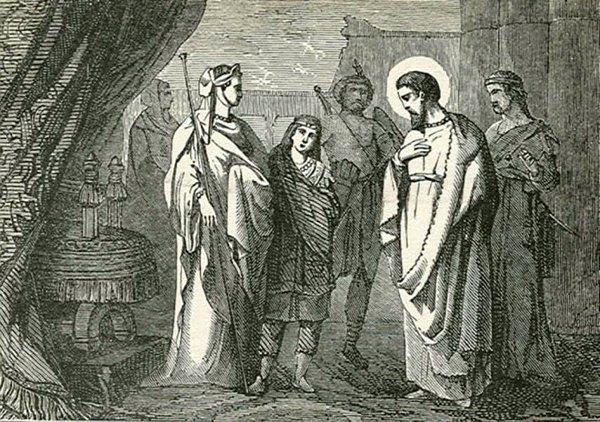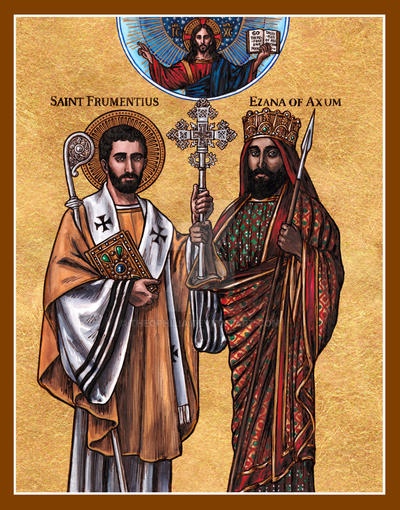Adapted from Various Sources.
St. Frumentius, Bishop and Apostle of Ethiopia († 383; Feast – October 27)
A certain philosopher name Metrodorus, out of curiosity, a desire of seeing the world, and improving his stock
of knowledge, made several voyages and travelled both into Persia (Iran) and Farther India (perhaps Afghanistan).
At his return he presented Constantine the Great, who had then lately made himself master of the East, with a quantity of
diamonds and other precious stones and curiosities, assuring that prince that his collection would have been much more
valuable, had not Sapor, King of Persia, seized the best part of his treasure. His success encouraged Meropius,
a philosopher of Tyre (now a city of Lebanon), to undertake a like voyage upon the same motive. But God, Who
conducts all the steps of men, even when they think least of Him, raised in him this design for an end of infinitely
greater importance and value than all the diamonds which the philosopher could bring back. Meropius took with him two
of his nephews, Frumentius and Edesius, with whose education he was entrusted. In the course of their voyage homewards,
the vessel touched at a certain port of the Red Sea to take in provisions and fresh water. The natives of that land
(probably to the north of modern-day Ethiopia – perhaps Eritrea), who were then at war with the Romans, stopped the
ship and put the whole crew and all the passengers to the sword, except the two boys, who were studying their lessons under
a tree at some distance. When they were found, their innocence, tender age, and beauty pleaded strongly in their favor,
and moved the aggressors to compassion.
They carried the boys to their king, who resided at Aksum (in northern Ethiopia). The prince was
charmed with the wit and sprightliness of the two boys and so he took special care of their education and upbringing.
Not long after, he made Edesius his cup-bearer, and Frumentius, who was older, his treasurer and secretary of state –
entrusting him with all public writings and accounts. They lived in great honor with this prince, who on his deathbed
thanked them for their services, and in recompense gave them their liberty.
 After his demise the queen, who was left regent for her eldest son, entreated them to remain at court, and assist her in
the government of the state, wherein she found their fidelity, abilities, and integrity her greatest support and comfort.
St. Frumentius had the principal management of affairs, and desiring to promote the Faith of Christ in that kingdom,
engaged several Christian merchants, who traded there, to settle in the country, and procured them great privileges,
and all the conveniences for their religious worship, and by his own fervor and example strongly recommended the true
religion to the infidels.
After his demise the queen, who was left regent for her eldest son, entreated them to remain at court, and assist her in
the government of the state, wherein she found their fidelity, abilities, and integrity her greatest support and comfort.
St. Frumentius had the principal management of affairs, and desiring to promote the Faith of Christ in that kingdom,
engaged several Christian merchants, who traded there, to settle in the country, and procured them great privileges,
and all the conveniences for their religious worship, and by his own fervor and example strongly recommended the true
religion to the infidels.
When the young king, whose name was Aizan, came of age, and took the reins of government into his own hands,
the brothers resigned their posts, though he invited them to stay. Edesius went back to Tyre, where he was afterwards
ordained a priest. But St. Frumentius having nothing so much at heart as the conversion of the whole nation, took the
route of Alexandria, and entreated the holy Archbishop, St. Athanasius, to send some pastor to that country, ripe for a
conversion to the Faith. St. Athanasius called a synod of Bishops, and by their unanimous advice ordained and consecrated
St. Frumentius himself to be Bishop of the Ethiopians, judging no one more proper than him to finish the work which he had
begun. [The Abyssinians or Ethiopians received the first seeds of the Faith from the eunuch of their Queen Candace,
who being baptized by St. Philip the Deacon (Acts 8: 7), afterwards initiated many of his countrymen in the Christian
religion, as Eusebius assures us (l. 2 c. 1). But the Abyssinians acknowledge that they owe their conversion
principally to St. Frumentius. They were in later years caught up in the Eutychian heresy, and to this day many of them
believe Christ to have had only one nature.]
 St. Frumentius, vested with this sacred character, went back to Aksum, and gained great numbers to the Faith by his discourses
and miracles; for seldom did any nation embrace Christianity with greater ardor, or defend it with greater courage.
King Aizan and his brother Sazan, whom he had associated in the throne, received Baptism, and by their fervor were a spur
to their subjects in the practice of every virtue and religious duty.
St. Frumentius, vested with this sacred character, went back to Aksum, and gained great numbers to the Faith by his discourses
and miracles; for seldom did any nation embrace Christianity with greater ardor, or defend it with greater courage.
King Aizan and his brother Sazan, whom he had associated in the throne, received Baptism, and by their fervor were a spur
to their subjects in the practice of every virtue and religious duty.
The Arian Emperor Constantius conceived an implacable jealousy against St. Frumentius, because he was linked
in faith and affection with St. Athanasius; and when he found that Frumentius was not even to be tempted, much less seduced
by him, he wrote a haughty letter to the two converted kings, in which he commanded them with threats, to deliver up the
Saint into the hands of George, the barbarious invader of the See of Alexandria. This letter was communicated by them to
St. Athanasius, who inserted it in his Apologia to Constantius.
The holy Bishop Frumentius continued to feed and defend his flock until it pleased the Supreme Pastor to
recompense his fidelity and labors. The Abyssinians honor him as the Apostle of the country of the Aksumites,
which is a considerable part of Ethiopia. They also place among the Saints the two converted kings.
In nearly every age since the time of Christ, some new nations have been added to the fold of Christ;
and the apostacy of those that have forsaken the path of Truth, has been repaired by fresh acquisitions. This is the
work of the Most High; the wonderful effect of all-powerful grace. It is owing to the Divne blessing that the heavenly
seed fructifies in the hearts of men, and it is God Who raises up and animates with His Spirit zealous successors of the
Apostles, whom He vouchsafes to make His instruments in this great work. We are indebted to His gratuitous mercy for the
inestimable benefit of this light of Faith. If we do not correspond faithfully, with fear and trembling, to so great a grace,
our punishment will be so much the more dreadful.
Back to "In this Issue"
Back to Top
Back to Saints
NEW: Alphabetical Index
Contact us: smr@salvemariaregina.info
Visit also: www.marienfried.com


 After his demise the queen, who was left regent for her eldest son, entreated them to remain at court, and assist her in
the government of the state, wherein she found their fidelity, abilities, and integrity her greatest support and comfort.
St. Frumentius had the principal management of affairs, and desiring to promote the Faith of Christ in that kingdom,
engaged several Christian merchants, who traded there, to settle in the country, and procured them great privileges,
and all the conveniences for their religious worship, and by his own fervor and example strongly recommended the true
religion to the infidels.
After his demise the queen, who was left regent for her eldest son, entreated them to remain at court, and assist her in
the government of the state, wherein she found their fidelity, abilities, and integrity her greatest support and comfort.
St. Frumentius had the principal management of affairs, and desiring to promote the Faith of Christ in that kingdom,
engaged several Christian merchants, who traded there, to settle in the country, and procured them great privileges,
and all the conveniences for their religious worship, and by his own fervor and example strongly recommended the true
religion to the infidels. St. Frumentius, vested with this sacred character, went back to Aksum, and gained great numbers to the Faith by his discourses
and miracles; for seldom did any nation embrace Christianity with greater ardor, or defend it with greater courage.
King Aizan and his brother Sazan, whom he had associated in the throne, received Baptism, and by their fervor were a spur
to their subjects in the practice of every virtue and religious duty.
St. Frumentius, vested with this sacred character, went back to Aksum, and gained great numbers to the Faith by his discourses
and miracles; for seldom did any nation embrace Christianity with greater ardor, or defend it with greater courage.
King Aizan and his brother Sazan, whom he had associated in the throne, received Baptism, and by their fervor were a spur
to their subjects in the practice of every virtue and religious duty.